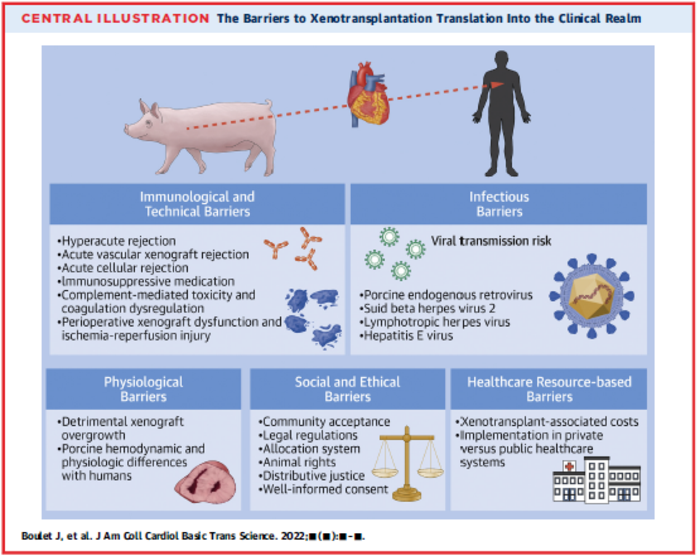“The potential for xenotransplantation to allow for an unlimited donor supply and resolve the organ shortage is now closer than ever,” according to a new paper published today in JACC: Basic to Translational Science. Approximately one in 20 heart failure patients will progress to an advanced heart failure stage each year. The growing need for heart transplantations combined with a shortage of suitable donor organs has spurred research interest in xenotransplantation.

Credit: Boulet J, et al. J Am Coll Cardiol Basic Trans Science. 2022
“The potential for xenotransplantation to allow for an unlimited donor supply and resolve the organ shortage is now closer than ever,” according to a new paper published today in JACC: Basic to Translational Science. Approximately one in 20 heart failure patients will progress to an advanced heart failure stage each year. The growing need for heart transplantations combined with a shortage of suitable donor organs has spurred research interest in xenotransplantation.
In January 2022, a 57-year-old heart failure patient successfully underwent transplantation surgery to receive a genetically engineered porcine heart; the patient survived for approximately two months. In this review, the study authors discuss the 2022 clinical case, along with the innovations, advances, challenges and barriers to successfully transplanting animal hearts into human subjects.
To review an embargoed copy of the paper, or to speak with an outside expert for comments, contact Sam Roth at [email protected]. In addition, a copy of the paper’s central illustration is available.
###
The American College of Cardiology envisions a world where innovation and knowledge optimize cardiovascular care and outcomes. As the professional home for the entire cardiovascular care team, the mission of the College and its more than 56,000 members is to transform cardiovascular care and to improve heart health. The ACC bestows credentials upon cardiovascular professionals who meet stringent qualifications and leads in the formation of health policy, standards and guidelines. The College also provides professional medical education, disseminates cardiovascular research through its world-renowned JACC Journals, operates national registries to measure and improve care, and offers cardiovascular accreditation to hospitals and institutions. For more, visit acc.org.
The ACC’s family of JACC Journals rank among the top cardiovascular journals in the world for scientific impact. The flagship journal, the Journal of the American College of Cardiology (JACC) — and family of specialty journals consisting of JACC: Advances, JACC: Asia, JACC: Basic to Translational Science, JACC: CardioOncology, JACC: Cardiovascular Imaging, JACC: Cardiovascular Interventions, JACC: Case Reports, JACC: Clinical Electrophysiology and JACC: Heart Failure — pride themselves on publishing the top peer-reviewed research on all aspects of cardiovascular disease. Learn more at JACC.org.
Journal
JACC Basic to Translational Science
DOI
10.1016/j.jacbts.2022.05.003
Method of Research
Case study
Subject of Research
People
Article Title
Cardiac Xenotransplantation: Challenges, Evolution, and Advances
Article Publication Date
15-Jun-2022
COI Statement
Dr. Mehra reports payments made to his institution from Abbott for consulting, consulting fees from Janssen, Mesoblast, Broadview Ventures, Natera, Paragonix, Moderna and Baim Institute for Clinical Research; he is a scientific advisory board member for NuPulseCV, Leviticus and FineHeart.




